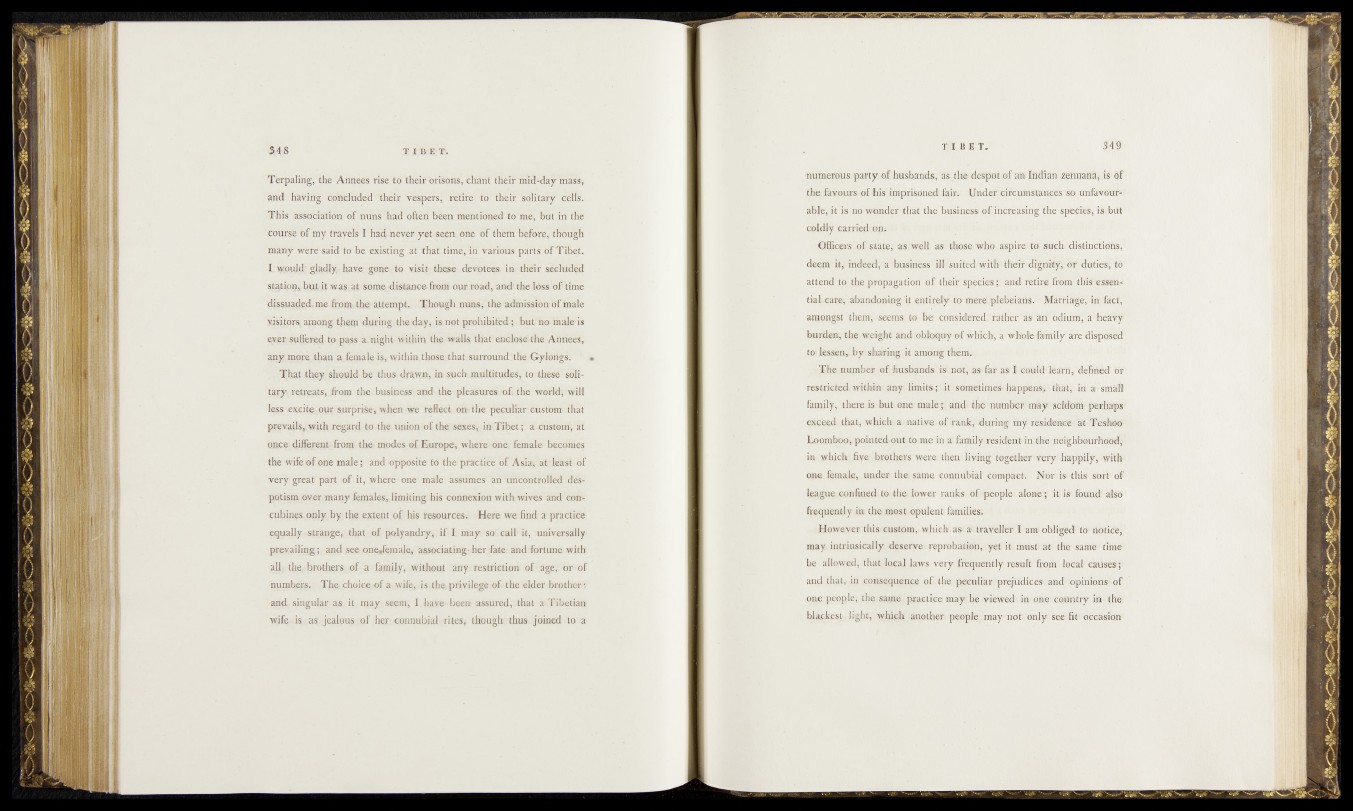
Terpaling, the Annees rise, to thrir cwitoasj ehaUf their mid-day mass,
and having concluded their vespers, retire fö' their solitary Cells.
This association of nuns had often been mentioned to me, but in the
course of my travels I ha$ heyer- yetseen one of them before, though
many were said to be existing at that time, in various parts of Tibet;
l ^opldc gfediyr have gone, to visit these devotee» in. their sècluded
st^tiop, but, it was at some distance-from our road, and" the loss of time
dlssuadpAme from^ the, attempt, 'Chough, nuns, the-adinissjon of inale
visitor^ apaong them during theday,jb,not prohibited; but. no, male is
qyer.sufferqd. to pass a night -within the walls that enclose the-Annees,
any more than a female is, within those, that surround; the Gylongs.-1 ' •
That, they should be thus, drawn-, in ,s_uch multitudes, to-these sofi-
tary retreats,..from the- business-, and the pleasures, of, the. world, will
l^s excite our surprise j when we reflect, on, the peculiar? bus tom; that
prevails, with regard to-the.union of the; sexes,- in-Tibet- ; a custom, at
once different - from the modes, of Europe, where One. female- becomes
the wife of one male; and opposite to the practice of Asia-, at least of
very great part of it, where one male assumes an uncontrolled despotism
over many females, limiting his connexion with wives and con=:
cubines- only by, the extent of: his resources. Here. we. find a practice
equally strange, that of polyandry, if I may so:.call it, Universally
prevailing ; and see one»female,- associating- her fate and fortune with
all the, brothers of a family, without any restriction of age, or of
numbers. The chqice.of' a wife, is,the.privilege of the elder brother:
and singular as, it may seem, I.have been: assured, that a Tibetian
wife is-as jealous of her connubial rites, though, thus joined to a
numerous party; of husbaud^^ tl®; despot atr Indian naM, is of
the favours df^S.im|^iiiUnM4%i#i: tttdercilcam'Siatiggs s&.aifeV8t8PJ!
able, it is no WOftdcr that thcij^mjfpssref’muuising the species,- is-.bUf
coldly carried on.
GfEote of state,as well as those who aspire to such -dfetlnCti-dhs,-
deem it, indeed, a business flil:srt^dtWith- thd?fJdtg4i£y, eH* duties, to
attend to the propagation of thetf species;, and, retirevflqhiithis essen-
tial-cavev abandoning ‘it entirely to trrerC'pl'ehei'anss. Mdrifilgfiylif fact,
amongst them*, seems to be considered rather' anwdiiim, a heavy
burden, the weight and obloquy of Whitby -a Whole fttrfliFy ath disposed’
to lessen, by- sharing it among them,
, The marnbetr of husbands is not:, as for aS- f GOUlih teitrft', defined: Si6
restricted within. aniy limits Sflra sometime» tepp’tasy- fh#t,- id a1 'sm-a'IP-
famifly, there; is:hub one male p. and: iihe nuwb^ltoby’<se|dBfii>; ptalhapls-
exceed that, which a-native. of'rank,, during tpy r^idMisB-Vat Teshad-
Loomboo,. pointed out to me in a foranly> resident in- the Beighbeurhhwp
in .which five brothers -wen» then1 livingtog^heV-'vciy: hkppily», with-1
ope female, .updfer thei same connubial compaetc* Noriissthis'* sbrtEof»’
league confined, tor the; lower ianhs»,Mlfte©pfe. atone;: it i# fotm# ^§©;
frequently in the most opulent families! -1;
However this» custom,, which as»' m traveller? 1 aAtoMiged* th hdtieOj
may intrinsicrdlly deserve: reprebation,>vy^ it,! must:!at! thb5 sad#'tiffin
be allowed, that local laws very frequently resuft from local1 c&iise#f»
and that, lip consequence of the.* peculiar prejudices) afecP'BptnioifSlof
qnepeoplej the same, practice may be viewed in one • country iii< the
blankest, fight, which another; people may* not? only« see-fit* occasion